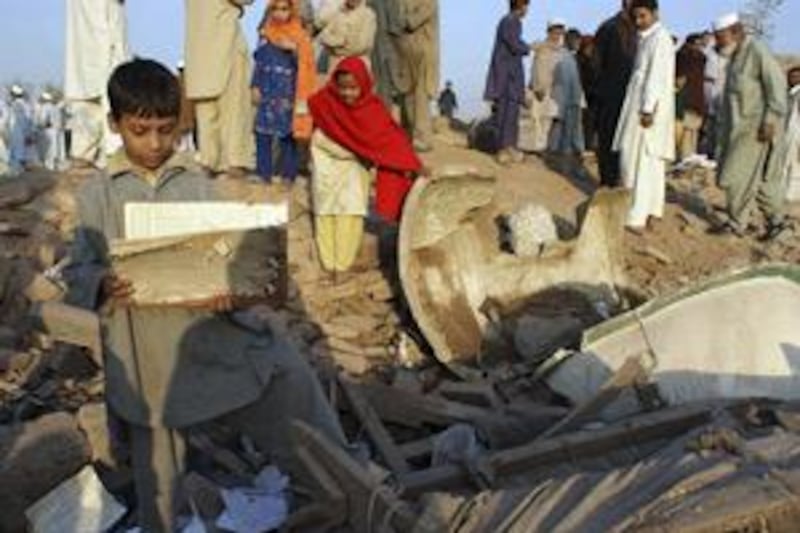ISLAMABAD // The north-west Pakistani city of Dera Ismail Khan, the launch pad for a military operation against insurgents in neighbouring South Waziristan, has been transformed into a security fiefdom ruled by intelligence operatives and a steely policeman, residents said in a series of telephone interviews.
The transformation of the city, commonly referred to as DI Khan, has been rapid and radical. Just four months ago, it was Pakistan's most violent city, a major achievement in notoriety, considering the competition. Residents had become virtual prisoners in their homes, as opposing factions of an assortment of blood feuds carried out tit-for-tat assassination campaigns on its streets: Shiites versus Sunnis, Shiites vs Rajput migrants from India, and pro-state militants against anti-state rivals from South Waziristan.
The death toll had averaged three a day since the beginning of the year, most of the victims being average people, such as bakers and fruit sellers, targeted for sectarian or ethnic identity. That was until June, when the government decided to move against the largest faction of the Tehrik-i-Taliban Pakistan and its al Qa'eda cohorts in South Waziristan. Local journalists said the job of cleaning up DI Khan's bloodied streets was entrusted to Gul Afzal Afridi, a senior superintendent of police, who had earned a formidable reputation during a stint of duty in the city in the mid-1990s.
"He assumed the post on the condition that there would be no political interference in his work. The first thing that he did was to fix the local police, many of whom had deserted their posts. In less than four months, he has brought the killing to a complete halt," said a local journalist, who spoke on condition of anonymity. "Now, not even a sparrow can flutter its wings unless he allows it." Residents said the police, working with operatives of the military intelligence directorate, had detained hundreds of people from South Waziristan and North Waziristan during a citywide search of rented accommodation. DI Khan is the winter home of thousands of Mehsud and Wazir tribesmen from the Waziristans, who migrate there to avoid subzero temperatures in mountainous areas.
The detainees are taken to police stations, where they are subjected to a meticulous process of elimination from suspicion, said residents of a boys' hostel above the Gulf shopping centre. Several hostel residents, all students who asked not to be named, described how on October 23 they had been woken up at 4am by bangs on their doors by a raiding party of soldiers, assigned two to a room. The students, all tribesmen from the Waziristan region, were ordered out of the rooms and made to sit on the floor of the corridor with eyes cast down, while a search was conducted.
"I didn't dare to look up because a soldier had a cocked-and-loaded G3 assault rifle pointed straight at my head," a student of the city's Gomal University said. The university is also home to 40 foreign students from the Palestinian territories, Sudan and Syria, most of whom are pursuing degree courses in pharmacology. University administrators have barred them from leaving the campus for a month, concerned that they could be tempting kidnap victims for militants hiding in DI Khan, students said.
The hostel residents said the soldiers, who had been led to the hostel by a captured suicide bomber, arrested two high school pupils. The others were allowed back into their rooms, but the reprieve was brief. A police team arrived at 10am, first noting down all the residents' personal details before taking 76 of them and five hostel staff off to several police stations. About 50 of those residents were taken to the city police station, where they were locked in a cell measuring 15 square metres, including a toilet behind a small partition wall.
Turn by turn, they were made to pose for mugshots, while holding a black slate with their details, and then interviewed by a team of investigators comprising the area deputy superintendent of police and two plainclothes military intelligence officers. The detainees' files were then despatched to the city intelligence headquarters, presumably to be checked against a database of wanted terrorists, and, once the "all clear" was given, they were released.
About a dozen of the hostel residents remain in custody, residents said. Despite draconian security measures, journalists said residents were relieved to be rid of the multi-tiered threat of death, and petitioned authorities to cancel plans to transfer Mr Afridi. However, residents fear the sweeping detentions of student tribesmen were alienating a generation upon whom the future stability of the Waziristans, and neighbouring DI Khan, would depend.
"Of course we accept that police raids, detentions and investigations are essential for peace. Had the police been humane and polite in their treatment, we would have left singing their praises. Instead, they were rough and rude, and we are resentful," said a released detainee, speaking on condition of anonymity. "Don't they realise their thoughtless actions create sympathy for the terrorists?" @Email:thussain@thenational.ae





